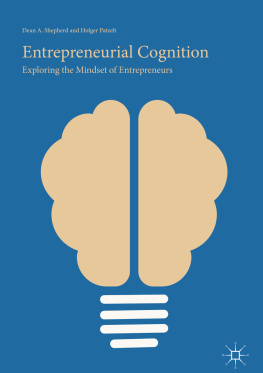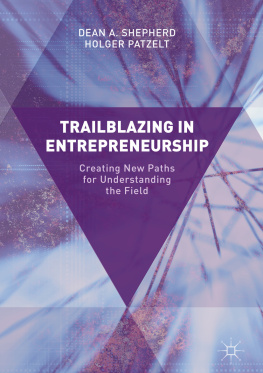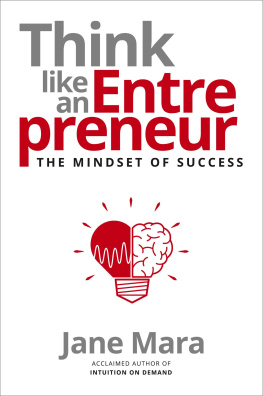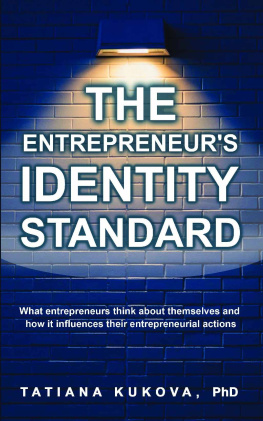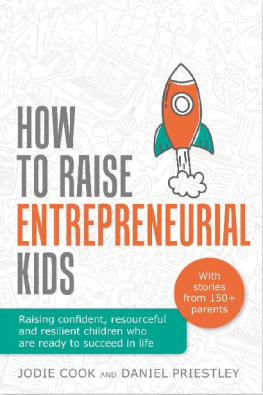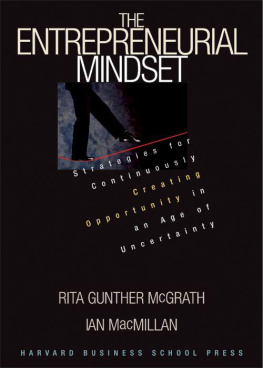1. Introduction
How do people think? By understanding how people think, we can do a better job of explaining their actions . Both of us (the authors) were drawn to this topic in the extreme context of entrepreneurship. This context is extreme because the actions associated with entrepreneurship can have a substantial impact on the individual taking the actions , the economy, communities , the environment, and society as a whole. For example, to explain why one individual creates a venture to benefit the community (Shepherd and Williams ), we need to understand peoples cognitionswhat happens in their minds. Not only are the outcomes of entrepreneurial actions extreme (in their impact), but the associated decision making is also extremeextreme in uncertainty , complexity, time pressure, emotionality, and identity investment. We felt that investigating cognition under such extreme conditions afforded us the opportunity to workand push forwardthe knowledge frontier. That is, we were able to take the existing body of knowledge (from relevant literatures on cognitive science, decision making, and other aspects of psychology) and adapt it, twist it, and blend it to make a new form that would explain entrepreneurial cognition. For example, how do people make decisions in highly uncertain environmentsthat is, when one does not know the odds of different alternative outcomes occurring (i.e., risk), nor does one even know the possible alternative outcomes because, at this stage, they are not yet knowable? Such decisions typically need to be made quickly (e.g., before the window of opportunity closes) and require substantial investment of cognitive and emotional resources, and the impact of these decisions is highly consequential (e.g., a misstep could lead to failure).
The topic of entrepreneurial cognition has fascinated us and motivated our research over the last two decades. Although this research has resulted in publications in the top entrepreneurship, strategy, management, and psychology journals, we thought now would be a good time to pause, reflect on our work, and bring these individual pieces of the puzzle together to provide a cohesive big picture of entrepreneurial cognition. This book is the culmination of our motivation to provide this big picture.
Entrepreneurial Context and Cognition
The environments organizations operate within are complex and dynamic and often involve swift, significant, and discontinuous change (Hitt ). On the other hand, however, uncertainty surrounding these environmental changes source, magnitude, and consequences can make identifying and acting upon opportunities a challenging endeavor. Why are some individuals and managers able to identify and successfully act upon opportunities in uncertain environments while others are unable to do so?
The current book proposes that an important answer to the above question emerges from the individuals entrepreneurial mindset. Entrepreneurship scholars explore how opportunities to bring into existence future goods and services are discovered, created, an exploited, by whom, and with what consequences (Venkataraman : 120). Specifically, over that last two decades, scholars have conducted various studies with the aim to better understand the components, antecedents, and outcomes of an entrepreneurial mindset; these studies have explored how characteristics of individuals, teams, organizations, and environments facilitate or obstruct entrepreneurial thinking and action. This book culminates the results of our research on this topic. In various studies, we have applied a cognitive lens to understand individuals knowledge, motivation, attention, identity, and emotions in the entrepreneurial process.
First, in a series of studies we have explored the role of prior knowledge at the start of the entrepreneurial process. We assume that heterogeneity in individuals knowledge provides an answer to one of the most important questions in entrepreneurship research: Why do some individuals recognize new business opportunities while others do not? More specifically, we ask: How do different types of knowledge trigger the recognition of different types (e.g., commercial, sustainable, health-related, international) of opportunities? How do different sources of knowledge (internal and external to the entrepreneur) influence opportunity recognition? Having identified important types and sources of knowledge, how do cognitive processes, in particular structural alignment, in conjunction with prior knowledge impact opportunity identification? In Chap. , we address these questions drawing on extant research from both cognitive science and entrepreneurship.
Second, beyond knowledge, motivation is an important driver of entrepreneurs identification and subsequent exploitation of opportunities. While we acknowledge the motivational role of financial rewards for entrepreneurship and explore how financial rewards interact with prior knowledge, we note that many entrepreneurs are driven by non-financial motivation. What types of motivation other than financial can motivate (or demotivate) entrepreneurial action? What types of motivation trigger the exploitation of opportunities targeted toward sustaining nature or the communal environment and developing society as a whole? And how does ones psychological and physical health impact entrepreneurial motivation? What is the role of ones personal values in driving such motivation? And finally, what triggers the motivation to persist with entrepreneurial action in the face of obstacles (as opposed to engaging in it in the first place)? In Chap. we address these questions from multiple theoretical angles to gain a comprehensive understanding of what motivates entrepreneurs to discover, exploit, and persist with new opportunities of various types.
Third, management and entrepreneurship research has highlighted the important role of attention in the entrepreneurial process. Given that attention is a limited cognitive resource, allocation to those aspects of the environment that are related to new opportunities is central to entrepreneurial action. How can managers attention be guided in organizations to facilitate opportunity identification? How does the allocation of entrepreneurs attention impact opportunity evaluation? What drives managers attention to underperforming entrepreneurial projects? Finally, how does attention interfere with entrepreneurs metacognitive processesprocesses which are known to be of central importance to develop entrepreneurial cognition? In Chap. , we try to answer these questions and illustrate how attentional processes guide entrepreneurial cognition.
Fourth, one important topic in psychology research is to understand how individuals develop their self-identitythat is, how do they answer the question Who am I? This research has shown that a meaningful self- identity is central to individuals psychological functioning and well-being. How can entrepreneurs develop such a meaningful identity that balances distinctiveness and belonging and therefore maximizes well-being? Further, how can entrepreneurs manage different micro-identities across different situations (e.g., entrepreneur and family member)? How can individuals use an entrepreneurial career to recover from traumatic events that disrupt their current work identities? And finally, in the specific case of family businesses where business-related and family-related identities highly overlap, how can entrepreneurs cope with identity conflict? In Chap. , we tackle these questions drawing on optimal distinctiveness theory and other theoretical streams from the identity literature.

